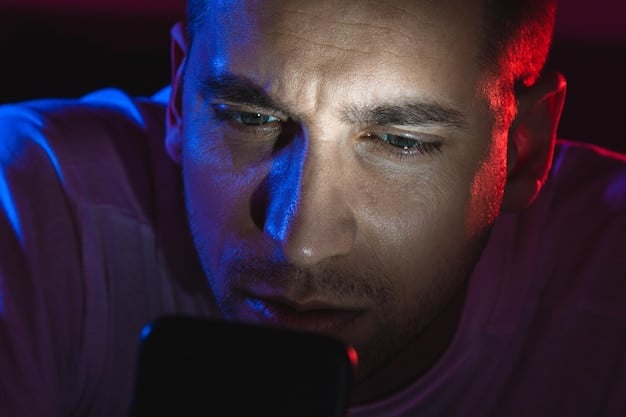Reality TV’s Psychological Effects: Impact on Viewers and Participants

Reality TV’s psychological effects encompass issues with body image, increased aggression, and altered perceptions of reality, impacting viewers and participants alike through social comparison and the pursuit of fame.
The glitz and glamour of reality TV have captivated audiences for decades, but what lies beneath the surface? The reality TV’s psychological effects: understanding the impact on viewers and participants is crucial for anyone engaging with this popular form of entertainment. Let’s delve into the psychological impact these shows can have on both those who watch and those who participate.
Understanding the Appeal of Reality TV
Reality TV has become a mainstay in entertainment, drawing in millions of viewers across the globe. But what exactly makes these shows so captivating? Understanding the underlying psychological factors can shed light on their enduring popularity.
Several elements contribute to the magnetic draw of reality television. These include parasocial relationships, the desire for social comparison, and the thrill of vicarious experiences.
The Allure of Parasocial Relationships
Parasocial relationships are one-sided relationships viewers develop with on-screen personalities. These relationships create a sense of familiarity and connection, making viewers feel as though they know the participants personally.
The intimacy fostered by parasocial relationships can lead to increased engagement with the show and its characters, as viewers become invested in their lives and storylines.
- Emotional Connection: Viewers often form emotional bonds with their favorite participants, experiencing joy, sadness, and anger alongside them.
- Sense of Belonging: These relationships can provide a sense of belonging, especially for viewers who may feel isolated in their own lives.
- Perceived Intimacy: The constant exposure to participants’ lives creates a perception of intimacy, even though the relationship is one-sided.
- Loyalty: Viewers may become fiercely loyal to their favorite participants, defending them against criticism and supporting their endeavors.

Social Comparison and Self-Esteem
Reality TV also taps into our inherent desire for social comparison. Viewers often compare themselves to the participants on screen, assessing their own lives, appearances, and relationships in comparison.
This social comparison can have both positive and negative effects. While some viewers may feel inspired to improve their own lives, others may experience feelings of inadequacy or low self-esteem.
Ultimately, understanding the appeal of reality TV involves recognizing the psychological factors that draw viewers in. By being aware of these influences, viewers can engage with the content more critically and thoughtfully, mitigating potential negative impacts.
The Psychological Effects on Viewers
While reality TV can be entertaining, it also has potential psychological effects on viewers. From influencing perceptions of reality to impacting self-esteem, the impact can be significant.
The consumption of reality TV has been linked to several psychological outcomes, including altered perceptions of reality, body image issues, and increased levels of aggression.
Distorted Perceptions of Reality
One of the most concerning effects of reality TV is its potential to distort viewers’ perceptions of reality. The heavily edited and often dramatized content can create unrealistic expectations about relationships, careers, and life in general.
Viewers may begin to believe that the exaggerated scenarios and manufactured drama they see on screen are representative of real-life experiences, leading to disappointment and disillusionment.
Body Image and Social Comparison
Reality TV often showcases idealized versions of beauty and success, which can fuel social comparison and body image issues. Viewers may feel pressure to conform to these unrealistic standards, leading to anxiety, depression, and disordered eating.
The constant exposure to seemingly perfect bodies and lifestyles can erode self-esteem and create a sense of inadequacy, especially among young and impressionable viewers.
- Increased Anxiety: The pressure to conform to unrealistic beauty standards can lead to increased anxiety and self-consciousness.
- Depression: Feelings of inadequacy and low self-esteem can contribute to symptoms of depression.
- Disordered Eating: The desire to achieve the “perfect” body can lead to unhealthy eating habits and disordered eating patterns.
- Body Dysmorphia: Viewers may develop a distorted perception of their own bodies, focusing on perceived flaws and imperfections.
Increased Aggression and Violence
Some studies have suggested a link between exposure to reality TV and increased aggression and violence. The confrontational and often hostile interactions between participants may normalize aggressive behavior and desensitize viewers to violence.
Viewers may begin to imitate the aggressive behavior they see on screen, leading to increased conflict and aggression in their own lives.
It’s essential to approach reality TV with a critical eye, recognizing its potential to shape our perceptions and behaviors. By being mindful of these impacts, we can mitigate negative effects and engage with the content more responsibly.
The Psychological Effects on Participants
While viewers may experience psychological effects from watching reality TV, the participants themselves are often subjected to even greater psychological challenges. The intense pressure of being constantly filmed, judged, and scrutinized can take a significant toll.
Participants may struggle with issues such as anxiety, depression, identity crisis, and difficulty reintegrating into normal life after their time on the show.
Anxiety and Depression
The highly stressful environment of reality TV can trigger or exacerbate anxiety and depression. Participants may feel overwhelmed by the constant pressure to perform, the fear of being judged, and the lack of privacy.
The social isolation and alienation participants often experience during and after the show can also contribute to feelings of anxiety and depression.
Identity Crisis and Loss of Authenticity
Participants may struggle with their sense of identity as they try to navigate the demands of the show and the expectations of the producers. The pressure to portray a certain character or fulfill a specific role can lead to a loss of authenticity and a sense of disconnect from their true selves.

After the show ends, participants may struggle to reconcile their on-screen persona with their real-life identity, leading to confusion and a sense of loss.
Challenges of Reintegration
Returning to normal life after being on reality TV can be challenging. Participants may struggle with the loss of attention and validation, the scrutiny of the public, and the difficulty of adjusting to a less stimulating environment.
The fame and notoriety that come with being on reality TV can be both a blessing and a curse, making it difficult for participants to maintain normal relationships and careers.
- Loss of Privacy: Participants may struggle with the loss of privacy and the constant attention from fans and media.
- Difficulty Finding Employment: The stigma associated with reality TV can make it difficult for participants to find meaningful employment.
- Relationship Strain: The stress and demands of being on reality TV can strain relationships with family and friends.
- Exploitation and Manipulation: Many participants have reported feeling exploited and manipulated by producers, leading to feelings of anger and resentment.
The psychological effects on reality TV participants are complex and multifaceted. It’s crucial for participants to have access to mental health support and resources to help them navigate the challenges of fame and the transition back to normal life.
The Role of Social Media
Social media plays a significant role in amplifying the psychological effects of reality TV, both for viewers and participants. The constant stream of updates, comments, and criticisms can intensify feelings of social comparison, anxiety, and self-doubt.
Social media also provides a platform for cyberbullying and harassment, which can have devastating consequences for participants who are already struggling with the psychological pressures of being on reality TV.
Amplifying Social Comparison
Social media intensifies social comparison by providing endless opportunities to compare oneself to others. Viewers can easily access curated images and highlights of participants’ lives, creating an illusion of perfection and success.
This constant exposure to idealized versions of reality can fuel feelings of inadequacy and low self-esteem, especially among young and impressionable users.
Cyberbullying and Harassment
Social media provides a platform for cyberbullying and harassment, which can have devastating consequences for reality TV participants. Participants may be subjected to hateful comments, personal attacks, and even threats of violence.
The anonymity afforded by social media can embolden bullies and make it difficult for participants to defend themselves. The constant barrage of negativity can take a significant toll on their mental health and well-being.
The Pressure to Maintain a Perfect Image
Social media also creates pressure for participants to maintain a perfect image and constantly curate their online presence. Participants may feel compelled to post filtered photos, share only positive updates, and engage in performative activism to please their followers.
This pressure to maintain a flawless online persona can be exhausting and contribute to feelings of inauthenticity and anxiety.
The intersection of social media and reality TV creates a complex and potentially harmful environment. It’s crucial for viewers and participants alike to be mindful of the potential psychological effects and to prioritize their mental health and well-being.
Mitigating the Negative Effects
While reality TV can have several negative psychological effects, there are steps that viewers and participants can take to mitigate these impacts. By being mindful of the potential risks and taking proactive measures, it’s possible to engage with the content more responsibly and protect one’s mental health.
These steps include developing media literacy, practicing self-care, and seeking professional help when needed.
Developing Media Literacy
One of the most effective ways to mitigate the negative effects of reality TV is to develop media literacy skills. This involves learning to critically evaluate the content you consume, recognizing the techniques used to manipulate emotions and create drama, and understanding the potential biases and agendas behind the shows.
By being a more informed and discerning viewer, you can reduce the likelihood of being swayed by unrealistic portrayals of reality and harmful messages.
Practicing Self-Care
Self-care is essential for maintaining mental health and well-being, especially when engaging with potentially triggering or emotionally draining content. This includes setting boundaries, limiting screen time, engaging in activities that bring joy and relaxation, and practicing mindfulness and self-compassion.
By prioritizing self-care, you can build resilience and protect yourself from the negative impacts of reality TV.
Seeking Professional Help
If you find that reality TV is significantly impacting your mental health or well-being, it’s essential to seek professional help. A therapist or counselor can provide support, guidance, and coping strategies to help you navigate the challenges and develop healthier patterns of engagement.
Don’t hesitate to reach out for help if you’re struggling. Mental health is just as important as physical health, and seeking professional support is a sign of strength, not weakness.
Mitigating the negative effects of reality TV requires a proactive and mindful approach. By developing media literacy, practicing self-care, and seeking professional help when needed, viewers and participants can protect their mental health and engage with the content more responsibly.
The Future of Reality TV and Mental Health
As reality TV continues to evolve, there is growing awareness of the potential psychological effects on both viewers and participants. The future of the genre may involve greater emphasis on ethical production practices, mental health support, and responsible content creation.
This shift towards greater awareness and responsibility could lead to more positive outcomes for all involved.
Ethical Production Practices
Producers may begin to adopt more ethical production practices, such as providing better mental health support for participants, reducing the emphasis on manufactured drama, and being more transparent about the editing process.
These changes could help to create a more supportive and less exploitative environment for participants, reducing the risk of psychological harm.
Mental Health Support
Increased emphasis on mental health support for participants could become standard practice. This may involve providing access to therapists and counselors during and after the show, as well as offering resources and support groups to help participants navigate the challenges of fame and reintegration.
By prioritizing mental health, producers can demonstrate a commitment to the well-being of their participants and help to reduce the long-term negative effects of being on reality TV.
Responsible Content Creation
Reality TV may begin to shift towards more responsible content creation, focusing on stories that promote positive values, inspire viewers, and encourage empathy and understanding.
By creating content that is both entertaining and meaningful, reality TV can have a more positive impact on society and help to reduce the negative psychological effects on viewers.
The future of reality TV hinges on a greater awareness of the potential psychological effects and a commitment to ethical production practices, mental health support, and responsible content creation. By prioritizing the well-being of viewers and participants, reality TV can continue to evolve as a source of entertainment while minimizing the risk of harm.
| Key Point | Brief Description |
|---|---|
| 🤔 Appeal of Reality TV | Parasocial relationships and social comparisons drive viewing. |
| 😥 Viewer Effects | Distorted reality, body image issues, and increased aggression. |
| 🤯 Participant Challenges | Anxiety, identity crisis, and difficulty reintegrating into normal life. |
| 📱 Social Media Impact | Amplifies social comparison and cyberbullying. |
Frequently Asked Questions
▼
Parasocial relationships are one-sided relationships viewers form with on-screen personalities, feeling emotionally connected as if they know the participants personally, leading to increased show engagement.
▼
The heavily edited and dramatized content can create unrealistic expectations about relationships, careers, and life, leading viewers to believe that exaggerated scenarios are representative of real-life.
▼
Participants often struggle with anxiety, depression, identity crises, and difficulty reintegrating into normal life after their time on the show due to the intense pressures they face.
▼
Social media intensifies social comparison by providing endless opportunities to compare oneself to others, leading to increased exposure to cyberbullying, which can have devastating consequences.
▼
Viewers can develop media literacy skills to critically evaluate content, practice self-care to protect mental health, and seek professional help if they find the content significantly impacting their well-being.
Conclusion
Understanding the psychological effects of reality TV on both viewers and participants is crucial for responsible engagement with this popular form of entertainment. By recognizing the potential impacts on mental health and well-being, and by taking proactive steps to mitigate negative effects, individuals can enjoy reality TV while protecting their psychological health.





